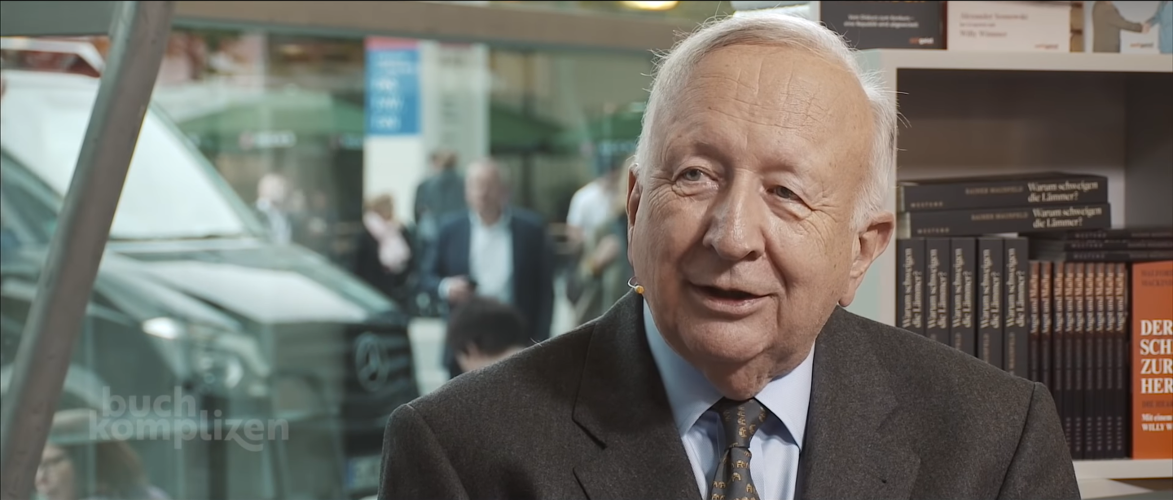A commentary by Roberto J. De Lapuente.
“Religion, the: Belief established by doctrin, statutes and its confession.” “Science : Faith established by doctrine, statutes and its confession.” What? The two cannot be the same? Maybe they used to be. But today it is decidedly different.
“There is a water lily growing in the pond. It grows very fast and every day doubles the space it occupies on the surface. On the 29th day, the lake is half overgrown. Then how long will it take for the lake to become completely overgrown?” Answer from a mathematician: “One day.” Politician’s answer, “Twenty-nine days.” I found this parable a while back from a lawyer and No Covid activist on Twitter. I replied to her that the parable was based on a false premise: Namely, exponential growth. But that had not existed in all this time.
Of course, this is not true. In the beginning, there was one infected person. Then there were at least two more the next day, so that there must have been exponential growth, i.e. doubling of the daily value. However, this took place at the lowest level. And only at the very beginning of the pandemic. Otherwise, however, it was absent. The lawyer had no understanding at all for my objection, she did not go into it any further.
Hard, even harder lockdown: modern flagellations
On the other hand, she simply stated that politics has to make decisions based on scientific facts and considerations. I disagreed with that, moreover, because politics has to keep more in mind than just science. Her response to that, “Sure.” With a teary-laughing smiley face. It’s a bit idle to keep repeating this: But to make political decisions according to scientific, which in this case means virological and medicinal, considerations – and only according to these criteria – passes any basic democratic conception.
Such an approach would suit a technocratic system. We have already come dangerously close to such a system. Whereby one would have to speak with the technocracy of a system, which professionally implements and executes findings. And not, as in our case, a system that punches through measures without evidence-based foundations – as one says so expertly today. The technocracy knows something and acts on it – but what we experience is in many parts a construct of faith.
The campaign around “No Covid”, for example, does not stand out because of established knowledge, based on science (1): It is a confession, the product of a perplexed state of mind, which believes that radicalism is now the last word of wisdom. It has in this respect a note of the radicalisms which have produced various belief systems so far. One has only to think of the flagellants of the Middle Ages, who chastised themselves with the scourge in order to humbly bring mankind, punished by God through the plague, before the Almighty. Only through hardness towards oneself, according to the basic thesis, one could mitigate God’s punishment.
Do I believe science?
The self-chastisement as an explanatory approach cannot be simply pushed away even in today’s discourse. Today, hardly anyone uses flagellation (2) – except perhaps for sexual reasons. Spirituality is more modern in this sense, it even gets along without God. The old religion has been replaced by a scientific world view, to put it simply. But the drive for religious commitment has not been lost to mankind because of this. Religion as a word comes from the Latin religare, which could be freely translated as “to bind oneself”. What is meant is the binding to orthodox rules, which religious communities tend to give themselves.
Mankind has cultivated such a desire for commitment over several millennia. One can therefore already assume that it is immanent in the human species. Why should this be different, been lost in the age of science? Therefore, sentences that can be often heard today, namely wanting to believe science, turn out not to be paradoxical or incoherent at all. Certainly, one can also believe what one can know. Indeed, one may even have to do so in particular.
This does not mean, of course, that science is now a quite ordinary religion. Its claim is a different one. But there is a deep popular faith that has no interest whatsoever in a critical illumination of what generates knowledge. It does not want to know how it is created, nor does it ask whether what is knowable is something that leads us forward as human beings or as a society. Philosophers often complain that they have lost their interpretive sovereignty because the various faculties now provide answers to the questions that philosophy used to address. As a result, however, a classifying authority that deals with meta-questions has also been lost. This vacuum has opened the gates to a science that is almost spiritually appraised.
No discussion now, this is science!
There is no time to discuss, deliberate and weigh up the political implementation scientific findings: One often reads such demands at present. Namely, there would be times for discussion and times for action. And because we don’t have to simply impose any frippery here, but rather measures based on science, we don’t have to discuss things at length: Just do it. In general, there would be no need to discuss subjects that come from the scientific community. In short, the lesson to be learned from this attitude is: Stop discussing, it’s science after all!
This attitude is nothing less than a deeply rooted orthodoxy. After all, if science is one thing, it is the fact that people talk to each other, discuss things, and come to conclusions based on the exchange. Of course, this does not mean that one now enters into a dialogue with people who completely deny the approach. But if you want to turn scientific findings into political decisions, you also have to include in the dialogue those who have fundamental reservations, who doubt the implementability, and who note that the partial scientific claim stands in the way of other partial scientific findings.
After all, it is still the case that those who now speak of evidence-based fundamentals and thus think that everything is scientifically verifiable always see only one partial aspect: We are talking about virology. Medicine may also have something to say about it. But what about sociology? Psychology? Economics? Cultural studies? These are all sciences that pursue different approaches and invite discussion. But since there is no time for discussion, they fall behind, are ostracized as sciences. Because science does not engage in discussion now. What matters now is to change the world. Not to exchange ideas.
Confessions: Longings of an otherwise irreligious time
Basically, it is not science as a whole that is mutating into orthodoxy, reinterpreting itself into a religious commitment. It is virology that is undergoing this transformation. But it has taken on the claim to want to be – to have to be – the mother of all sciences. It is the real science, without it all other faculties are helpless and lost. This is the hubris of a discipline that we observe here. It no longer speaks of virology, but of “the science” and thus means itself. The delusion no longer demands factual references, it wants confessions, offers itself to a symbolism that submits, that replaces the factual reference with conviction, faith, even piety.
Under certain circumstances, this religiosity must also be explained by a longing that is immanent to the human condition. An urge for commitment that longs for orientation – and that has to give up objectivity and sober distance in order to be able to be absorbed in devout belief. Scientific distance is not a good advisor for ensoulment: only the fervor of faith makes it possible to subordinate oneself and to integrate oneself into a community. It alone animates the cool matter of the scientific and turns it into a message, an orthodox concept (3) to which one can believe and adhere without thinking.
It is not at all surprising that this happens. In a more confessional age, this role would have been played by the churches. Today they serve only a small audience, a social niche. So religiosity has to make use of other phenomena. Pushing through somewhere else. Make use of other stylistic devices. Science in a mass and media society controlled by social networks seems to be predestined for this. Especially when it penetrates a climate, encounters a zeitgeist that leads in parallel to transhumanism, to the medical surveillance dystopia in which people are to become radiologists of themselves. In such a spiritual milieu, faith is not only an alternative: it becomes a prerequisite.
Sources:
- https://www.neulandrebellen.de/2021/01/wer-genau-ist-eigentlich-die-wissenschaft/
- https://www.sueddeutsche.de/bayern/mitten-in-bayern-die-hotspots-der-flagellanten-1.4848406
- https://www.neulandrebellen.de/2020/08/die-hygiene-religion-hygieneplan/
+++
Thanks to the author for the right to publish the article.
+++
This post first appeared on the Neulandrebellen blog on May 07, 2021.
+++
Image source: PopTika / shutterstock
+++
KenFM strives to present a broad spectrum of opinions. Opinion articles and guest posts need not reflect the views of the editorial team.
+++
KenFM now available as a free app for Android and iOS devices! You can get to the Apple and Google stores via our homepage. Here is the link: https://kenfm.de/kenfm-app/
+++
Subscribe to the KenFM newsletter now: https://kenfm.de/newsletter/
+++
You like our program? Information on other ways to support us here: https://kenfm.de/support/kenfm-unterstuetzen/
+++
Now you can also support us with Bitcoins.

Bitcoin-Account: https://commerce.coinbase.com/checkout/1edba334-ba63-4a88-bfc3-d6a3071efcc8










Kommentare (0)